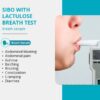- Your cart is empty
- Continue Shopping
‘All tests we do at FMD are aimed at finding the root cause of your health problem. These are not the usual diagnostic tests that you do, but much, much more.’
‘All tests we do at FMD are aimed at finding the root cause of your health problem. These are not the usual diagnostic tests that you do, but much, much more.’

₹37,999.00 ₹24,999.00
₹37,999.00 ₹24,999.00
Test Parameters:
Hydrogen and methane breath testing is a widely accepted means of identifying changes to the gut microbiome and is used to detect abnormal growth of bacteria in the small intestine, or small intestinal bacterial overgrowth (SIBO).
 Reporting Time: 2-4 weeks
Reporting Time: 2-4 weeks Breath Test
Breath Test Best and Honest Price
Best and Honest PriceHydrogen (H2) and methane (CH4) gasses are produced in the digestive system primarily only by the bacterial fermentation of carbohydrates (sugars, starches or vegetable fibers). The generation of H2 and/or CH4 will result in the absorption of some of these gases into the bloodstream from the site of their production, and they will appear in the expired air. If either of the gases appear in the expired air, it is usually a signal that carbohydrates or carbohydrate fragments have been exposed to bacteria, permitting such fermentation to take place and that SIBO can be suspected.
Studies have indicated that potentially up to 80% of patients with IBS may in fact have SIBO which this Hydrogen /Methane breath test can easily and non-invasively help determine.
Individuals experiencing the following symptoms should consider doing a SIBO test
Container
Patient preparation
* Please note this test will take 3 hours to complete.
Research
Order an SIBO Lactulose BreathTest it is just a few simple step!
please enter the data where the SIBO Lactulose Breath set should be send
Detailed instructions and a return envelope you will find in the SIBO Lactulose Breath set
After 2-4 weeks, you will receive detailed SIBO Lactulose Breath analysis.
Our Working Process Healthcare model is shifting from Sickness care to Wellness.
Sample collection will be done from home

Sample is processed at Central Lab of our Trusted Partners.

Reports are accessible online.
Sample collection will be done from home

Sample is processed at Central Lab of our Trusted Partners.

Reports are accessible online.
Autism Test FAQ's Functional Medicine Diagnostic FAQ's
There are historical differences between the term “Asperger’s” and what’s considered “autism.” Asperger’s was first introduced into the Diagnostic and Statistical Manual of Mental Disorders (DSM) in 1994, and was considered as a “mild” or “high-functioning” form of autism.
This happened because English psychiatrist Lorna Wing translated the works of Austrian physician Hans Asperger and realized his research found distinct characteristics in autistic children from those with “milder” symptoms. However, as of 2013, Asperger’s is now considered part of the autism spectrum and is no longer diagnosed as a separate condition. The only real “difference” between the two diagnoses is that people with Asperger’s may be considered as having an easier time “passing” as neurotypical with only “mild” signs and symptoms that may resemble those of autism.
Conventional diagnosis involves finding out whether the child’s behaviour meets a set of criteria for autism or ADHD, based on a set of questionnaires.
Functional Medicine approach is to individualize each and every autistic child and find the root cause of the imbalance. Tests commonly advised are to assess gut microbiome. Functional testing can also look at toxic load, nutritional status, food sensitivities, mitochondrial function and genetic susceptibility to poor detoxification.
Other Popular Test Packages Choose from our frequently booked test packages.